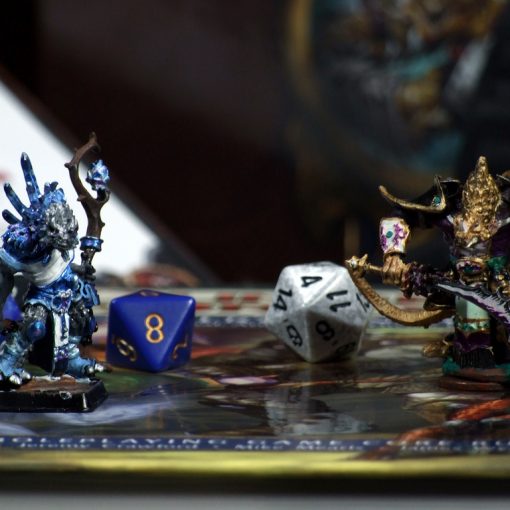Things have stabilized enough where I feel comfortable coming back to the post I wrote about King’s Quest III back in May. I mentioned in that post that I think it’d make a good fantasy scenario – let’s take a look at what that scenario would work like.
Meta Considerations
Before we get too far into the nitty-gritty of this thing as an adventure, I’d like to go over a few things to keep in mind.
This whole scenario is about PCs punching above their weight class and overcoming a superior foe through guile and trickery. If you make the wizard too paranoid, alert, and ruthless, it’ll be over before it starts. Player characters need some leeway to screw up and not have it immediately wind up as a TPK or something similar. Players in an adventure game can reload saves. You really can’t do that in a TTRPG, and so you have to adjust accordingly.
Remember also that “fantasy” in this case does not specifically mean D&D. While you definitely could run this in D&D, it’d also be pretty easy to run it in Burning Wheel, Symbaroum, a PbtA game like Fellowship, GURPS, FATE, Savage Worlds, and so on. If there was a more-or-less standard fantasy version of GUMSHOE, that’d also work (and in some ways might be ideal, actually). This particular adventure is less about combat and more about ingenuity and figuring things out.
The Premise
The premise is that the PCs are the prisoners of a powerful wizard (or other similar spellcaster) and they want to escape. In the source material, Gwydion/Alexander has a ticking clock that adds some urgency – when he turns 18, the wizard is going to kill him. Especially given what’s going on in the world these days, it’s probably a good idea to make this more than a simple “purchased as a chattel slave” kind of agreement. Perhaps the PCs were kidnapped as hostages to ensure the cooperation of their noble families or community. Maybe they were thieves who got caught trying to steal from the wizard and this is their punishment. Perhaps this is an apprenticeship gone horribly wrong. They may even be the wizard’s direct descendants (possibly grandchildren?) if you’re okay with the abusive family implications there.
The PCs should more or less have the run of the wizard’s estate, which can be anything from a large, comfortable house to a complex. There needs to be a fair amount of “normal” space – kitchen, living room, study, bedroom, etc. But there also need to be two types of special area: places where the PCs are not allowed to go, and places where the wizard does not deign to go that the PCs have access to.
The PCs should also have the means to get out from under the wizard’s thumb through means other than direct confrontation, but in order to do so, they will need to access forbidden areas and venture off-premises. In the source material, this means putting together the ingredients for a cat cookie and turning the wizard into a cat. In your version, it could be a potion that strips them of their magical abilities, presenting evidence of the wizard’s misdeeds to some higher authority that can hold them to account, or possibly even assembling the means to redeem the wizard.
The Opposition
The wizard should be a problem that the PCs cannot solve with violence, but they also should not be an omnipotent or omniscient being with no vulnerabilities at all. If you’re using D&D, you’d want this character to be a transmuter, evoker, or conjurer rather than a diviner or enchanter, most likely. It is very important that they not have supernatural awareness of the PCs’ every move, and it’s especially important that they not be able to rummage through the PCs’ minds at will.
However, the PCs should also be aware that the wizard can easily track them down if they just leave in the night. In the source material, Manannan had a telescope that he spied on the surrounding area with – for a TTRPG scenario, I’d give him some mercenaries, a thieves’ guild, a corrupt city watch, or other humint resources that he can draw upon to find wayward PCs.
Furthermore, they should have a certain level of malevolent patience. If one of the PCs raises a hand against the wizard, instead of being splattered or incinerated, they should be turned into something embarrassing for a while, teleported back to their room (and magically locked in) for a while, or otherwise humiliated in such a way that impresses upon the PCs that this isn’t a simple boss fight. In-character, this is easy to justify: humiliating underlings has a certain cruel satisfaction to it for an evil character, and good help is hard to find. Or perhaps in the case of a royal hostage, killing the PC would deny the wizard some leverage they’d like to maintain.
Finally, it’s vitally important that they have occasion to leave the PCs alone and unobserved for lengthy periods of time on at least a semi-regular basis. If the characters are constantly under surveillance, it’s going to be a boring game of the PCs doing mundane chores for a jerk. That doesn’t sound like much fun to me. In the source material, Manannan would announce to the player that he was going on a journey and teleport away. He would also sleep through the night – both of these times gave the PCs ample opportunity to get up to their schemes.
If you want to give the wizard some reinforcements, a familiar or similarly low-powered minion can work. In King’s Quest III, Manannan had a cat that was as surly and hateful as the wizard himself. However that runs the risk of basically installing a surveillance system, so tread carefully.
The Environment
Depending on how you flavor your wizard, this can be any number of different things. The source material had Manannan occupying a large, comfortable house that was still short of being a full-on mansion, but your wizard may have more elaborate or more modest digs. There should be an area or areas where they get up to their magical stuff that the PCs are not allowed to access. This area should be hidden and/or secured, but the PCs should be able to discover a way in through investigation and possibly teamwork. This is why I said GUMSHOE would be a good system choice in some ways earlier on, but you don’t have to use the system itself to make use of its sensibilities. Allow the PCs to get core clues without having to roll for them, and let their information-gathering skills give them additional useful information that they don’t necessarily need, but would certainly be helpful.
In other words, the PCs should find out how to get into the wizard’s magical lab pretty early on, but maybe at some point they find the wizard’s personal calendar and can plan for when they’ll be gone (and when they’ll be back!) rather than working in an entirely opportunistic fashion.
There also should be some kind of PC quarters where the wizard doesn’t go and where the PCs can confidently hide stuff they’re amassing to facilitate their plan. Magical items are contraband, so if a PC has one and gets caught with it by the wizard, they should suffer some kind of punishment. Depending on the specifics, this might be a small cell with an uncomfortable cot, the barn, a barracks-like set of servant’s quarters, etc. In almost any case, the wizard will feel like such mean quarters are beneath them and will stay away unless extraordinarily provoked.
Flow of the Adventure
The PCs initially start out doing mundane chores for the wizard. This should serve to introduce them to the different environments in the game. The wizard should tell them “go sweep this room” or “go dust that room” or “feed the domestic animals here.” The Pcs should get a sense of their surroundings and each other.
And then the wizard should leave for the first time. Depending on the PCs, they may immediately start looking for trouble, they may relax, or they might try to jump the proverbial fence and run for it. In the first two cases, they should get away with it unless they break something. In the last case, they should make it to a nearby town and have a bit of fun exploring and interacting with people before the wizard shows up, angrily teleports them back, and punishes the group somehow (probably with extra and/or unpleasant work).
However that goes, the PCs should get an opportunity that night to talk and compare notes.
Repeat that loop until the PCs discover or devise some means of dealing with the wizard. Ideally, they should need to combine their efforts and make use of resources (physical or interpersonal) from their mundane surroundings, the local town, and the forbidden areas from the wizard’s home.
At the point where they start planning and preparing, start throwing some wrenches into their plans to make it interesting. They need something in town that’s for sale, but don’t have any money. How do they get money or steal the thing? The wizard comes back early from one of his trips or leaves suddenly when they’re about to spring their trap. Now what? And so on. Give them enough setbacks and changes in circumstances where it feels tense before letting them try their big plan.
Once they neutralize the wizard and leave for good (or lose in spectacular fashion and die or get turned permanently into toads or something) the adventure is over.
Variations
The basic premise can apply to a lot of different environments and settings. Sticking with fantasy, you can reskin the wizard as a powerful abbot or sensei for a monastery setting – the PCs will be acolytes or initiates of some kind. The wizard can be a sea captain and the PCs can be press-ganged crewmen for a naval setting. This can make for a wider variety of environments, if desired, and give the PCs some warning as the captain comes back on a rowboat. (If you’re looking for a good ship map to use for that in a D&D style game, I use this one for my PCs’ ship in the Sunday game.)
Moving things to a more modern setting gives the PCs the option of doing something digitally – maybe the wizard is a crime boss or kidnapper or a cult leader. The environment could be a fortified compound, an oil rig, or a remote mountain hideaway. A future setting opens up options of spacefaring mystical types, psionics, and even an AI as the wizard and environments like starships, space stations, asteroid mines, and so on become available.
What I would avoid is an actual prison or dungeon of some kind – this is a much more intimate type of escape scenario than a prison break, and the thing that makes this work is that the PCs have a bit more autonomy than prisoners do, despite not being allowed to leave.
Final Thoughts
One of the things that I like about this particular scenario is that it’s very easy to depict it in a family-friendly, low-stakes way and still have it be fun and interesting. The wizard doesn’t have to be some kind of sadistic flesh-crafting servant of a demon lord or elder evil of some kind. It’s perfectly effective to have them be a greedy jerk who kidnaps servants and keeps them from their families or controls members of their own family. You can turn the violence, horror, and mature themes all the way down to “G-rated Disney movie” and it’ll still have sufficient conflict and tension to keep a table engaged.
This could also make a good introductory adventure for a longer-running game. Shared struggles make for good bonding experiences, and depending on the nature of the wizard, there are lots of possibilities for PCs with vastly different backgrounds and skill sets to wind up forced to work together to escape their shared confinement.
Photo by Noah Silliman on Unsplash




